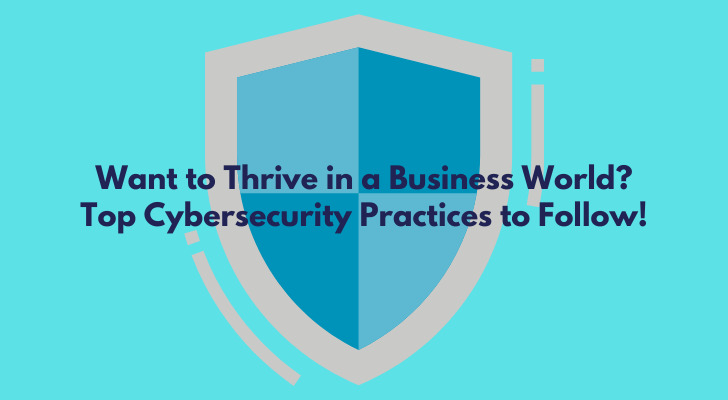From end consumers and security consultants to leaders, every company employee is responsible for defending the company against cyberattacks. As reported by Accenture's Cost of Cybercrime Survey shows that small businesses are the main target of cyberattacks.
There were 43% of cyberattacks happened on small businesses but sadly, 14% of businesses were ready to protect against cyber-attack. The decisions made by every staff member might mean the distinction between "just another ordinary day" and an extreme security incident that damages the brand's image and ultimately costs the company an enormous amount of cash.
We have created a compilation of guidelines on cybersecurity for safety professionals to adhere to in order to assist organizations in improving their security procedures. Without question, one of the offenses with the quickest growth rate is cybercrime, which threatens to affect organizations across all sectors.
Nevertheless, protecting yourself against cyberattacks is complicated. When fraudsters constantly search for novel techniques to disclose shortcomings in security, it is challenging to keep up. However, this article has listed the cybersecurity best practices that could help you stay away from online hazards.

Update software periodically
The potency of cyberattacks has risen because of ongoing technological improvements. As technology is incorporated into more and more aspects of our life, cybercrime has become a vital concept to look into. It has been surveyed that cyberattacks caused 92% of data breaches in 2022. Hence, it is important to keep the software updated. Software firms usually provide updates to incorporate new features, solve identified bugs, and boost security.
You must not forget to upgrade your software to the most recent version to safeguard yourself against newly discovered or preexisting safety risks. While preparing for installing updates, several things to keep updated are the OS, third-party apps or office apps, web extensions or browsers, and antivirus.
Use HTTPS on your website
The total cost of cybercrime was $3 trillion in 2015, but by ten years, the repercussions might triple. The problems consist of monetary vandalism, system hacking, fraud, the theft of banking or personal information, harm to reputation, etc. It has been anticipated that the cost of cybercrime globally could increase by 15% yearly, reaching $10.5 trillion annually in 2025.
It is critical for strengthening website safety and building consumer confidence in online transactions. Implementing an SSL certificate is one sensible step. Important information is protected during transmission between your website and its visitors, thanks to SSL certificates.
You can buy SSL certificate, which provides a variety of inexpensive choices catered to your unique needs. You may ensure the safe transfer of sensitive data by getting SSL certificates, which efficiently prevent illicit access from people with ulterior motives.
A padlock symbol and "https" in the website URL visibly identify these certificates, assuring users that their connection to the website is secure. Making SSL certificates a priority improves the overall safety of your website, fosters confidence among consumers, and protects against unauthorized access.

Train employees
Phishing, spyware, business email compromise or BEC, and ransomware are some of the devastating types of cybersecurity threats. In the 2019–2020 financial year, the Australian Cyber Security Centre (ACSC) reported around 4,250 BEC schemes, costing victims more than $142 million. On the other hand, ransomware attacks affect 64% of SMBs, where the con artists remotely infest a device and claim a charge to retrieve your files and systems.
Ensuring your staff is well trained, on-point, and constantly using cybersecurity practices is vital for rendering cybersecurity effective. Occasionally, a worker's error without the required training might bring down a whole safety mechanism.
As a part of giving them straightforward guidance on handling safety incidents, you can encourage employees to notify you of any questionable activity. Your defense against cyber assaults is strengthened, and a safety-conscious staff is fostered by investing in staff security training.
Avoid using public networks
When you join an open network, you share your information with every individual who is also online. Anything that you send over a wireless connection or obtain has security holes. Employ a VPN if you have to link to a public network, or avoid them entirely.
Around 50% USA citizens use WI-FI hotspot for monetary transactions and still 18% use public WI-FI for remote work. However, you must avoid using public Wi-Fi at any cost! The biggest perils associated with using a public connection are snooping & sniffing, man-in-the-middle attacks, and malware distribution.
Secure Wi-Fi
It is crucial to employ encryption along with durable passwords when setting up a wireless network's safety. It is also advisable to use unique passwords for multiple networks and frequently change them. Never use intimate data that is easy for an intruder to figure out.
Encrypted internet connections are necessary to stop unlawful manipulation of your private information. Wi-Fi networks are particularly vulnerable to assaults as they rely on radio waves to carry data, making anyone near the network's transmission able to view the information being sent. For complete wireless security, businesses should use five leading techniques: encryption, firewalls, IDS, VPNs, and ACLs.
Backups
Important data loss can result from an error in security. You ought to back up your important data to the cloud or a personal storage medium to recover it in the event of data loss or corruption. To preserve the confidentiality of information and lessen the effects of possible information loss, it is essential to back up critical information periodically. Systematic backup solutions can produce safe, reliable copies of vital company data.
You may protect your company from catastrophic data loss and guarantee uninterrupted operations of your business in the event of unplanned events by giving data backups the utmost importance.
Conclusion
Strong cybersecurity policies must be prioritized if you want to shield your company from the constantly changing risks of the digital age. You may considerably improve your company's security posture by putting the aforementioned procedures into practice.
These cybersecurity practices support risk reduction, client trust development, and the protection of private information. Keep in mind that maintaining cybersecurity requires continual attention to detail and flexibility. You can protect the resources of your business and ensure that it remains profitable by prioritizing cybersecurity.
Often seeking out additional responsibility; identifies problems and solutions; thrives on new challenges and adjusts to unexpected changes makes thoughtful, well-reasoned decisions; exercises good judgment, resourcefulness and creativity in problem-solving.
What Do You Advocate?

